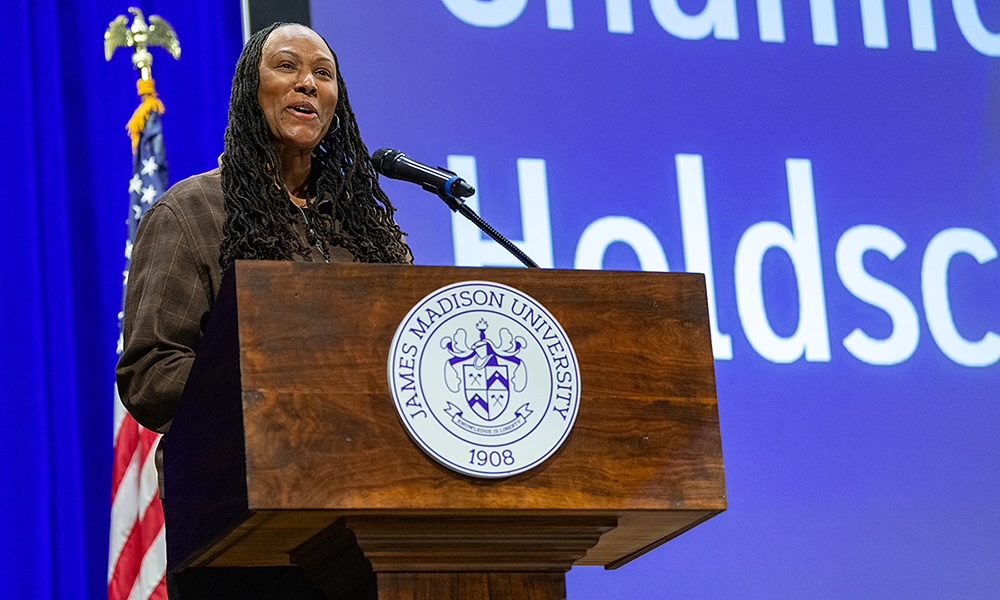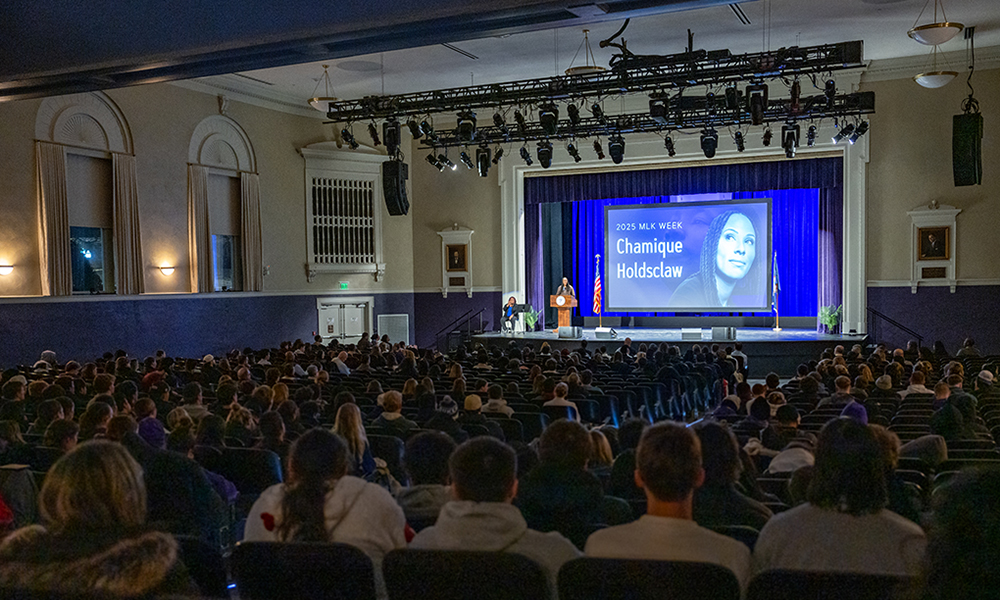WNBA legend delivers keynote address during Dr. MLK Jr. Week
Featured Stories
SUMMARY: Chamique Holdsclaw’s powerful address reinforces King’s ideals of service, love and community, inspiring student-athletes to invest in and lift up one another.
This article and other exclusive content is available in the Madison app. ![]()
For the past 38 years, the Center for Multicultural Student Services has recognized Martin Luther King Jr.’s birthday by hosting a weeklong celebration at JMU in commemoration of his legacy and service.
The national holiday usually falls the day before students return to campus for the start of the spring semester, but the full slate of Dr. Martin Luther King Jr. Week activities allows all Dukes to take part.
This year, JMU was honored to host WNBA Hall of Famer and mental health advocate Chamique Holdsclaw as keynote speaker, accompanied by performances that included the singing of the Black national anthem and poetry by Lauren K. Alleyne and Gbenga Adesina of the Furious Flower Poetry Center.
On the evening of Jan. 22, JMU student-athletes and coaches filled Wilson Hall, hoping to gain valuable insight from the legend herself.

Holdsclaw’s accomplishments on the basketball court speak for themselves — three straight NCAA national championships, Olympic gold medalist, No. 1 pick in the 1999 WNBA Draft, Rookie of the Year and six All-Star selections.
But behind the stardom lies a different story.
Growing up in New York City, her father struggled with undiagnosed schizophrenia, and it was eventually decided that she and her brother would live with her grandmother. The hardship of having to separate from her parents weighed on young Holdsclaw.
With the help of her grandmother, she started attending therapy, and at the age of 11, she was diagnosed with clinical depression. Also around this time, she was introduced to basketball.
“I always say, ‘There are athletes who need the game and athletes who just play.’ I was one of those who really needed it, because I needed that structure, I needed something that was my own,” Holdsclaw shared.
|
“I always say, ‘There are athletes who need the game and athletes who just play.’ I was one of those who really needed it, because I needed that structure, I needed something that was my own.” |
Throughout her childhood and adolescence, her grandmother played a pivotal role in supporting and challenging Holdsclaw. “My grandmother was a servant leader. She led with kindness, love and empathy … with healing. And I was just so taken aback with how she was always so gracious and giving,” she said.
Accompanied by her grandmother, Holdsclaw would volunteer each week at her local soup kitchen, where she learned the importance of treating everyone with dignity.
On the wall of the soup kitchen was a quote that would change her life in more ways than one: “Everyone can be great, because everyone can serve.”
Those words were spoken by King just months before his assassination, a reminder that if you have “a heart full of grace” and “a soul generated by love,” you are always able to give back.
Her grandmother offered similar advice: “Where you plant the seeds, they will grow. You have to learn to invest in your community.” With these words of wisdom in her back pocket, Holdsclaw began her illustrious college and professional basketball career.
|
“Where you plant the seeds, they will grow. You have to learn to invest in your community.” |
Her contributions to the women’s team at the University of Tennessee were coupled with her immense struggle to find her footing at the school, which lacked the diversity she was used to back home.
“When you are young, you are looking for your tribe, you are looking for that connection, you are looking for people who you can relate to, people who make you feel seen, heard,” Holdsclaw said.
Her coach, Pat Summitt, whom she jokingly referred to as the “mayor of Knoxville,” became another pillar of support. Summitt reminded Holdsclaw that her team was her family — the “tribe” she had been searching for.
Holdsclaw started to establish herself among the game’s all-time greats. But behind the scenes, her mental health started failing her.
Publicly, she said, she was doing all that was expected of her, winning games and playing into her celebrity status. But privately a part of her was dying. She called on the audience to remember that a lot of people suffer in silence with their mental illness.
It was in that moment of greatest need when the seeds she had planted, at her grandmother’s behest, started to blossom.
The communities she had invested in and built were the ones that would surround her with love and pull her out of a period of hardship. Even though accepting their support was difficult, the relentless efforts of her family, team and friends proved successful.
That is why, years after her retirement, Holdsclaw still upholds the pillar that King stood on and that her grandmother echoed — the power of community.
